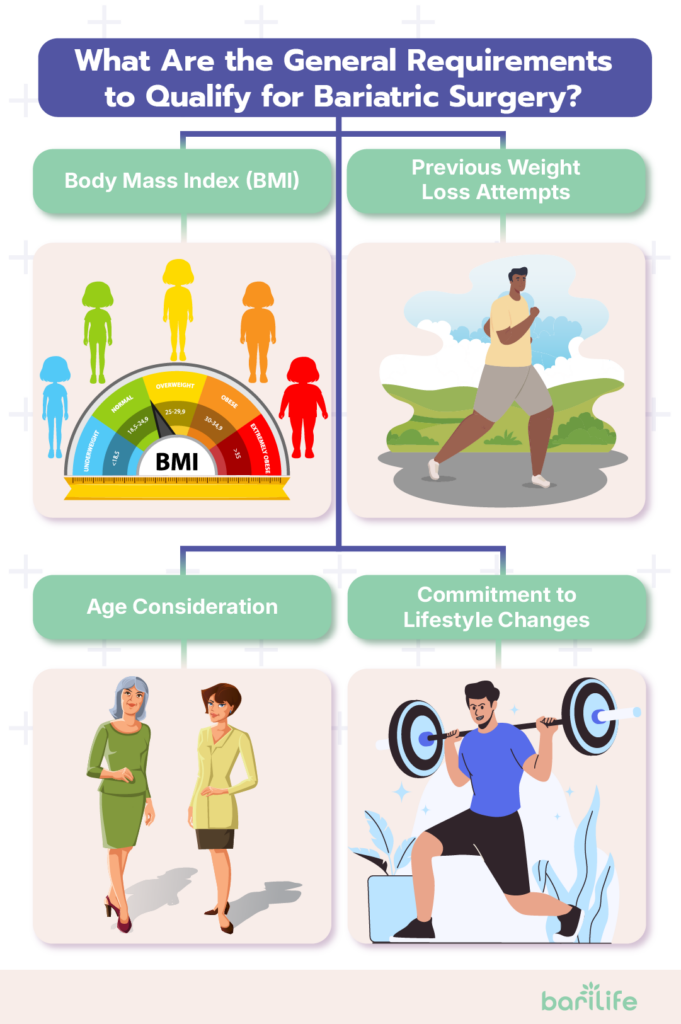Key Takeaways
- Bariatric surgery is a powerful tool for weight loss and improved health, but it requires lifelong commitment and lifestyle changes.
- Bariatric surgery requirements include BMI, previous weight loss attempts, age, and the ability to adhere to post-surgical guidelines.
- A psychological evaluation and overall health assessment help determine if surgery is the right choice for you.
Bariatric surgery is a significant decision that requires careful consideration. It’s not just about losing weight—it’s about transforming your entire approach to health and wellness.
Many people who qualify for surgery have struggled with having excess weight for years, trying various diets, exercise plans, and even medications with little to no long-term success. If that sounds familiar, you may be wondering whether surgery is your best option.
This article will help you understand what bariatric surgery is, the qualifications needed, and what to expect from the process. By the end, you'll have a clearer idea of whether this option is right for you.
What is Bariatric Surgery?

If you’ve been struggling with severe obesity and traditional weight loss methods haven’t worked, you might want to consider bariatric surgery. But what exactly is it? Simply put, bariatric surgery is a medical procedure that changes how your digestive system works to help you lose weight.
The main goal is to reduce health risks related to excess weight, like heart disease, diabetes, and high blood pressure. While it’s a powerful tool, it’s not a quick fix. It requires commitment and long-term lifestyle changes.
There are a few common types of bariatric surgery:
- Gastric bypass (roux-en-y): This procedure creates a small pouch in your stomach and reroutes your small intestine. It limits how much food you can eat and how many nutrients your body absorbs.
- Sleeve gastrectomy: Part of your stomach is removed, making it smaller. This reduces your appetite and how much food you can consume.
- Adjustable gastric banding: A band is placed around the upper part of your stomach to create a small pouch, helping you feel full faster.
These procedures can be life-changing, but they’re not for everyone. Let’s take a closer look at BMI for bariatric surgery and other qualifications to determine if you're a good candidate.
What Are the General Requirements to Qualify for Bariatric Surgery?
Bariatric surgery isn’t just for anyone who wants to lose weight. There are specific medical guidelines that help determine if it’s the right choice for you.
Body Mass Index (BMI)
Your BMI is a key factor in deciding if you qualify for surgery. You may be eligible if:
- Your BMI is 40 or higher.
- Your BMI is between 35 and 39.9, and you have serious health conditions linked to obesity, like type 2 diabetes or high blood pressure.
Previous Weight Loss Attempts
Bariatric surgeons typically want to see that you’ve tried other weight loss methods first. This includes changes in diet, exercise, and even medications. If those haven’t worked, surgery might be an option.

Age Consideration
Most candidates fall between 18 and 65 years old, though there can be exceptions. If you’re younger or older, your healthcare provider will evaluate your unique situation.
Commitment to Lifestyle Changes
Surgery is just the beginning. Long-term success depends on your willingness to make lifelong changes in how you eat, exercise, and care for your health. You’ll need regular follow-ups with your medical team to stay on track.
Are There Age Restrictions for Bariatric Surgery?
Age matters when it comes to bariatric surgery, but there’s no strict cut-off. Here’s how different age groups are considered:
- Adolescents: Surgery is considered on a case-by-case basis for teenagers with severe obesity and serious health conditions.
- Adults (18-65): Most people in this age range qualify if they meet the other requirements.
- Older Adults (65+): If you’re over 65, your healthcare provider will assess your overall health and surgical risks before making a recommendation.
What Medical Conditions Might Disqualify You From Bariatric Surgery?
While bariatric surgery is a great tool for weight loss, it’s not safe for everyone. Certain medical conditions can make the surgery too risky or less effective. Some of these include:
- Uncontrolled psychiatric disorders: Conditions like severe depression or schizophrenia that aren’t well-managed may impact your ability to follow post-surgical care.
- Substance misuse: If you struggle with alcohol or drug misuse, surgery may not be recommended until you receive proper treatment.
- Severe heart disease: Heart conditions can increase the risks associated with surgery.
- Blood clotting disorders: These conditions raise the chance of complications during or after the procedure.
- Inability to follow post-surgical guidelines: If you struggle to understand or commit to necessary lifestyle changes, surgery may not be the best option.
Your healthcare provider will assess your health history to determine if surgery is safe for you.
Do You Need a Psychological Evaluation?

A psychological evaluation is part of the pre-surgical process. This step isn’t meant to discourage you but to ensure you’re mentally prepared for the changes ahead.
Here’s what to expect:
- Mental health history: Your medical provider will review any past or current mental health conditions to see if they could affect your post-surgery success.
- Current psychological status: They’ll assess if you’re in a stable mental state to handle the emotional and physical adjustments required after surgery.
- Support systems: Having a strong support network of family and friends can make a big difference in your recovery and long-term success.
- Expectations and motivations: Understanding why you want surgery and setting realistic expectations can help you stay committed.
Conclusion
Bariatric surgery can be a life-changing tool for weight loss and better health, but it’s not for everyone. If you’re considering it, take the time to understand the requirements, risks, and commitment involved.
Ask yourself, "Is bariatric surgery right for me?" and talk to your healthcare provider to see if you’re a good candidate, and be prepared for the journey ahead.
How Bari Life Can Help
Navigating life after bariatric surgery can be overwhelming, but the right nutrition makes all the difference. Bariatric vitamins are essential for maintaining health, and Bari Life offers a complete range, including bariatric multivitamins, bariatric vitamins chewable, and a bariatric multivitamin with iron for convenience.
To support muscle recovery and energy, Bari Life provides bariatric protein shakes and bariatric protein bars, while bariatric snacks keep you on track without sacrificing taste. For bone health, bariatric calcium chews offer an easy way to meet your needs.
If you're experiencing hair thinning, bariatric vitamins for hair loss can help, and a bariatric probiotic supports digestion and gut health. Prefer a liquid option? Their liquid bariatric vitamin ensures quick absorption.
Ready to give your body the nutrients it needs for success? Check out Bari Life’s high-quality bariatric vitamins and supplements today!
If you want to learn more, why not check out these articles below:
- How Quickly Can I Get Bariatric Surgery?
- How To Get Bariatric Surgery Fast?
- Can You Have Bariatric Surgery If You Have H Pylori?
- When is Bariatric Surgery Recommended?
- What Can Disqualify You From Bariatric Surgery?
- How To Pass a Bariatric Psych Evaluation?
- What is a Bariatric Patient?

Leave a Comment
Your email address will not be published.